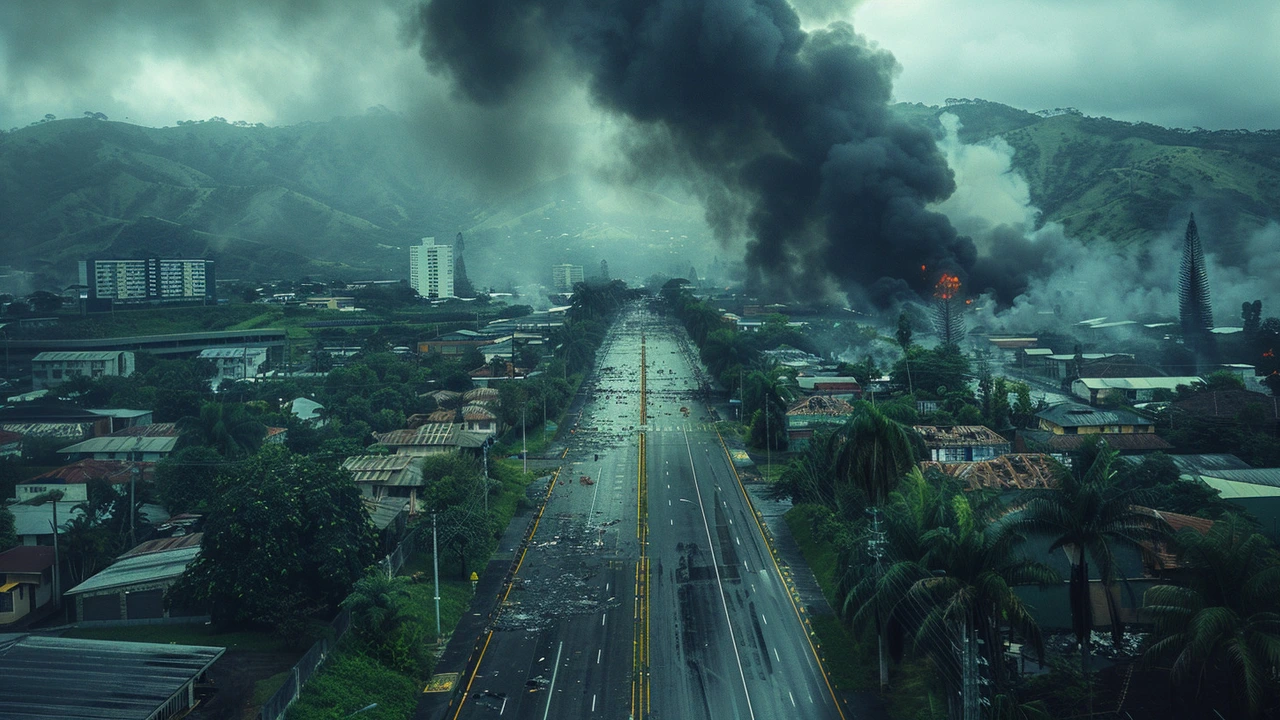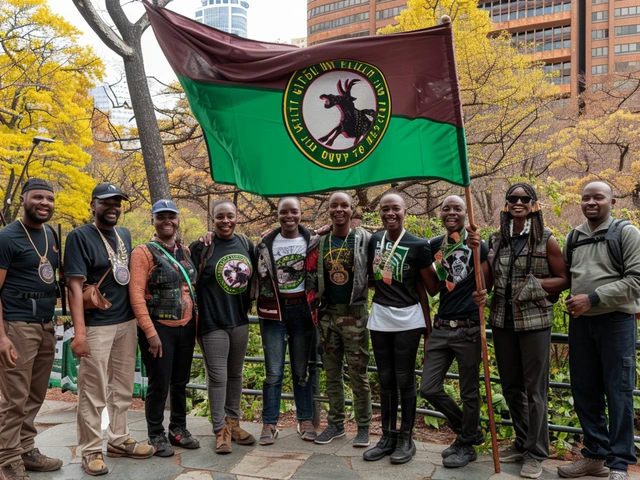New Caledonia Riots: A Deep Dive into the Escalating Conflict
The normally peaceful islands of New Caledonia have recently witnessed some of the most severe unrest in their history. Over the past 48 hours, the territory's capital, Noumea, descended into an alarming state of chaos and violence. The protests, initially peaceful, have culminated in a deadly conflict resulting in four tragic deaths, numerous torched public structures, and a state of emergency. These events shed light on the deep-running social and political unrest that has been brewing within the French Pacific territory.
The Spark: Constitutional Vote in Paris
At the heart of the riots lies a contentious constitutional vote in Paris. The new mandate seeks to expand New Caledonia's electoral roll, granting voting rights to French residents who have lived on the island for at least ten years. While this change is presented as a measured rebalancing of the electoral rights, it stands in direct opposition to the arrangements established in the 1998 Noumea Accord. The Accord was instrumental in redressing political imbalances in favor of Indigenous Kanak people, who have long been marginalized in the political landscape dominated by French settlers.
Kanak People's Grievances
Pro-Independence leaders within the Kanak community have expressed strong opposition to the amendments. They argue that the reforms undermine the political status of Indigenous Kanaks, effectively diminishing their already tenuous hold on local politics. The tensions were further aggravated by the final 2021 referendum on independence, which many believe was unfairly skewed due to the impact of the COVID-19 pandemic. Adversely affected by the harsh realities of the global crisis, the Kanak community found it challenging to mobilize and advocate for their cause effectively.
The Role of Social Disparities
But the anger and frustration evident in the riots are not solely rooted in political disenfranchisement. Local women leaders were quick to point out the underlying issues of wealth disparity and racial inequalities that have long plagued the region. Indigenous Kanak youths, who make up a significant portion of the population, find themselves grappling with limited opportunities and stark wealth disparities that leave them feeling desperate and powerless. These systemic injustices fuel the flames of discontent, turning peaceful protests into violent uprisings.
Voices of Women Leaders
In the midst of this crisis, voices from within the community, particularly from local women leaders, have called for a more inclusive dialogue. These leaders emphasize that the violence unfolding in Noumea cannot be addressed solely through political reforms. They advocate for a holistic approach that examines and ameliorates the socioeconomic conditions affecting their people. They contend that sustainable solutions require the inclusion of diverse perspectives and experiences. The deep-seated issues of inequality and marginalization must be discussed and resolved through a collaborative effort that involves all stakeholders.
Crisis Management and Political Leadership
Criticism is also being directed at political leaders, both local and from mainland France, over their handling of the crisis. Critics argue that the governmental response has been reactive rather than proactive, exacerbating the tensions rather than alleviating them. The imposition of a state of emergency, while necessary to control the immediate outbreak of violence, does little to address the underlying causes of the unrest. Political leaders are urged to engage in meaningful dialogue with the local communities, acknowledging and addressing their grievances rather than imposing top-down solutions.
The Path Forward
As New Caledonia grapples with the aftermath of the riots, one thing is clear: the status quo cannot be maintained. The territory stands at a crossroads, with an urgent need for substantive changes that address both political and socioeconomic grievances. The solution lies not in temporary measures or punitive actions but in a comprehensive strategy that addresses the root causes of discontent. The voices of the Kanak people, particularly the younger generation and women leaders, must be heard and integrated into the decision-making process.
In conclusion, the violent upheaval in New Caledonia serves as a stark reminder of the importance of inclusive and equitable governance. The tumultuous events in Noumea are not isolated incidents but the manifestation of long-standing grievances. As the territory moves forward, the focus must be on creating a more just and balanced society that embraces diversity and promotes equal opportunities for all its residents.




Wow, what an intense situation! The riots in Nouméa really show how deep the divide runs between the Kanak community and the French settlers-it’s not just politics, it’s a clash of histories, identities, and everyday realities. I think we need to look at the colonial legacy, the socioeconomic gaps, and the cultural misunderstandings all at once; only then can we start healing. The recent vote in Paris only adds fuel to an already blazing fire, and the state of emergency feels like putting a band‑aid on a broken leg. Let’s hope the dialogue includes genuine Kanak voices, especially women, who have been pushing for inclusive solutions for years-because without that, any reform will just be a hollow gesture!
Honestly, this whole “peaceful protest” narrative is a sham; the agitators just love to stir up chaos for attention.
Reading about the New Caledonia unrest is like opening a history textbook and seeing the same pages replayed in modern times; the echo of colonisation, the broken promises of the Noumea Accord, and the marginalisation of the Kanak people keep reverberating. The constitutional vote in Paris, which aims to broaden the electoral roll, might look fair on paper, but it disregards the lived experience of the Indigenous community that has fought for recognition for decades. When you think about it, the Kanak youths are dealing with unemployment rates that are double the national average, limited access to quality education, and a housing market that feels like a never‑ending maze. Women leaders have spoken out, highlighting that gender and ethnicity intersect, making the struggle even more complex. The wealth disparity is stark: while some French expats live in luxury villas, many Kanak families are confined to overcrowded settlements with poor infrastructure. This imbalance feeds resentment; it’s not surprising that what started as a protest turned violent when the streets were filled with frustration. The state of emergency, while perhaps necessary to prevent further loss of life, cannot be a substitute for real policy changes. We need comprehensive reforms that address land rights, economic opportunities, and cultural preservation. Moreover, the international community should keep an eye on the situation, not just for geopolitical reasons but because the right of indigenous peoples to self‑determination is a universal value. The media, too, has a role-too often, the narrative focuses on the immediate violence and forgets the systemic causes that have been simmering for generations. On the ground, local teachers are trying to incorporate Kanak languages into the curriculum, a step that could empower the next generation to keep their heritage alive. Simultaneously, NGOs are launching micro‑finance projects aimed at supporting Kanak entrepreneurs, hoping to break the cycle of poverty. Yet, such initiatives will flounder without supportive government policies that protect land ownership and ensure fair representation in parliament. It’s also essential to recognize that not all French residents are antagonistic; many stand in solidarity with the Kanak cause and are demanding a fair resolution. In short, the path forward demands a multi‑layered approach that blends political negotiation, economic investment, and cultural respect. Only then can we hope to transform the current turbulence into a sustainable peace.
The whole thing is sad. They need more jobs for the youth and less drama from Paris. If the gov’t listen to local people, maybe things will calm down.
I totally get the frustration everyone’s feeling-when you see centuries of inequality finally explode, it’s hard not to be angry. That said, I think we can channel this energy into something positive by supporting community‑led projects and pushing for transparent talks between the Kanak leaders and French officials. It’s crucial to keep the conversation going, not just in the news but in everyday chats, so the broader public stays aware and can lend its voice. We all have a part to play, whether it’s sharing reliable info, donating to trusted NGOs, or simply listening to the stories of those directly affected.
Another excuse from the powers that be-“we’re doing our best”-while the streets bleed. They love to pat themselves on the back for declaring an emergency, yet they ignore the root causes. It’s high time they stop the nonsense and give real power back to the people.